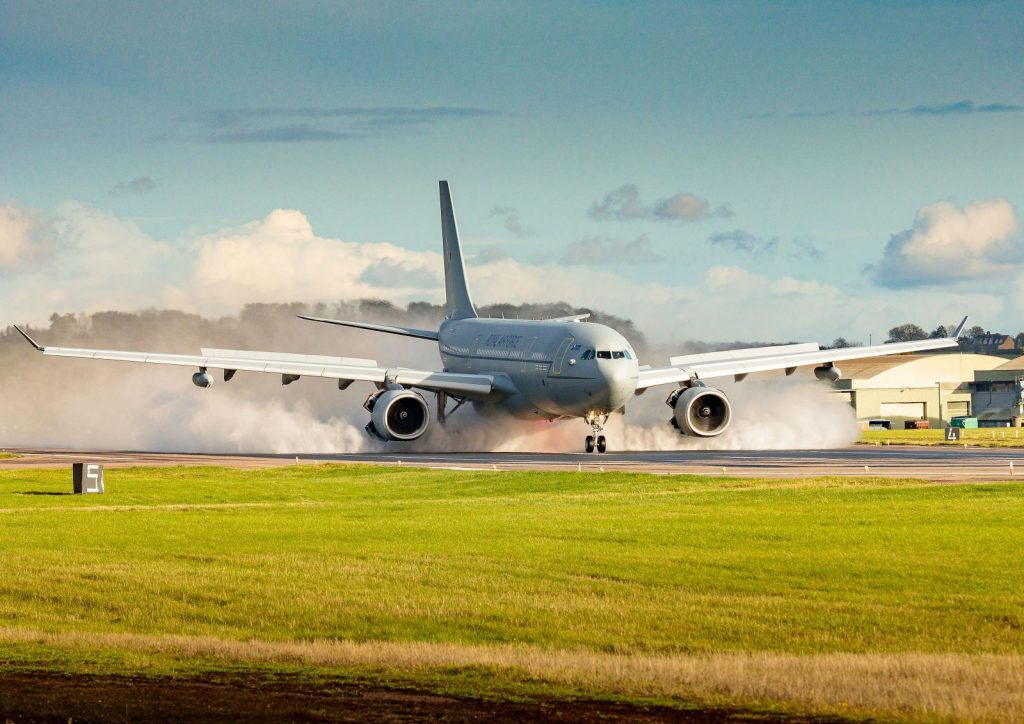In 2023, Airbus used more than 11 million litres of SAF in its operations – two times the volume of 2022. This exceeded the initial 2023 target of 10% of the total fuel used across Airbus’ divisions by more than a million litres and accounted for 0.02% of all SAF produced in the world over the year! This achievement contributed to the reduction of CO2 emissions by 23 587 tonnes. Here is how Airbus did it…
The Beluga is flying daily to move parts from manufacturing sites to final assembly lines. Since December 2019, Airbus is using SAF in these oversized operations as a key contributor in the roadmap to decarbonise.
Working with airlines Volotea and AirCorsica, Airbus supplies SAF for internal business travel. With the aim to reduce employee CO2 footprint, Airbus signed an agreement with Air France in 2023 to purchase SAF when travelling between five cities in Europe. This number will increase with more employee routes supplied with SAF as Airbus seeks to sign agreements with other airlines.
Flight tests play an important role in the growing use of SAF at Airbus. Airbus Helicopters is using SAF for development test flights and training in Marignane, France, and Donauwörth, Germany, and conducts demo flights like the one in Paris Air Show 2023 with the H160.
In Airbus Commercial Aircraft business, the second VOLCAN test flight campaign kicked off in March 2023, using an A321neo powered by 100% SAF, analysing residual emissions.
The A321XLR passenger test flight in October 2023 made sure Airbus employees were among the first to fly on Airbus’ extra-long range single-aisle aircraft, while flying with 30% SAF.
In 2023, Airbus delivered more aircraft with SAF than any other year, thanks to its increased availability for customers at Airbus delivery centres worldwide. Airbus has been proposing SAF to customers since 2016, however the company took it a step further when it started offering airlines up to 5% pure SAF, at no extra cost, to support their own decarbonisation journey. IndiGo was the first customer to take advantage of this offer for the delivery of a new A320neo from Toulouse.
Airbus Helicopters delivery flights are routinely performed with SAF when available. The intent is to increase SAF use across Airbus Helicopters Customer Centres worldwide, with the target of almost half a million litres of neat SAF in 2024.
To help the industry meet its goal of 17.5 billion litres of SAF by 2030 , Airbus partners with energy producers, airlines and airports around the world. The goal is to anticipate and project future volumes. This is why Airbus has joined initiatives such as the French “SAF in Occitanie” and the Japanese “Act for Sky” among many others! Airbus has also made a significant contribution to the development of local SAF production in Australia through a partnership with Qantas and the Queensland Government. In November 2023, under the International Civil Aviation Organization (ICAO) ACT-SAF initiative, Airbus and ICAO signed a Declaration of Intent to assess South America’s SAF feedstocks and production. Together with China National Aviation Fuel (CNAF), Airbus signed a Memorandum of Understanding to strengthen Chinese-European collaboration on SAF production, and standard formulation. Airbus set up a strategic partnership with DG fuels in the United States to support new technology and fuel production. Likewise, Airbus teamed up with Lanzajet to advance the building of SAF facilities. Additionally, a Memorandum of Understanding was signed between Airbus and Masdar, an Abu Dhabi energy company, to further develop SAF production.
All of these efforts – and more like them – were led by teams across Airbus, in every region of the world, and contributed to the Company’s 2023 objective to use 10% SAF in operations and customer deliveries. They have enabled Airbus to be a major SAF user globally. And while this is an important achievement, Airbus has set an even greater target for 2024 amounting to an average 15% of SAF in the fuel mix.




Recent Posts
Royal Caribbean Welcomes LNG-Fueled Star of the Seas to Its Fleet
Swire Shipping Launches ‘Voyage to Zero’ to Help Customers Cut Scope 3 Emissions Swire
Pinnacle Marine Launches B100-Powered President 100 for Biofuel Trials
Assam Puts Green Hydrogen Policy on Hold, Investors Reassess Plans
MNRE and Odisha Chart Roadmap for National Green Hydrogen Mission
Hyundai Glovis to Retrofit Seven PCTCs with Avikus AI Navigation System
Super Terminais orders three more Konecranes Gottwald ESP.10 Mobile Harbor cranes
Covestro and HGK Shipping Extend Partnership to 2040 with Focus on Wind-Assisted Vessel Retrofit